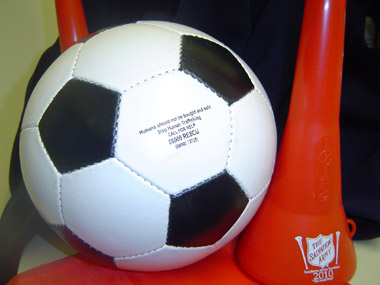 In the run up to the World Cup, The Salvation Army kick-started a campaign to help protect people in South Africa, a country that suffers a high level of violent crime, including kidnapping, assault and human trafficking.
In the run up to the World Cup, The Salvation Army kick-started a campaign to help protect people in South Africa, a country that suffers a high level of violent crime, including kidnapping, assault and human trafficking.
A major awareness campaign during the soccer event includes anti-trafficking messages on special Salvation Army World Cup items – water bottles, red cards, footballs and vuvuzelas (plastic trumpets that make a huge noise and are a common feature of soccer matches in South Africa). These items advertise a toll-free helpline launched by The Salvation Army's Southern Africa Territory for victims of trafficking. The hotline is also for community members who are concerned or have a tip-off about trafficking in their neighbourhood.
Alongside the awareness campaign, The Salvation Army is making an effort to prevent trafficking by providing safe venues for children during the World Cup. Throughout the winter school holidays, corps (Salvation Army churches) are hosting free soccer clinics and kids clubs across the country for safe fun and games in celebration of the international sports event. The Army plans to reach 10,000 children through the clinics and clubs and hopes that this will be the catalyst for many of the participants to become regular attendees at ongoing kids programmes.
Throughout the World Cup and into the future The Salvation Army will also be ready to assist victims of trafficking through its existing safe houses for women and children.
Captain Patti Niemand, a member of the territory's anti-human-trafficking task team, says children are among the most vulnerable to human trafficking. 'These children [in the kids clubs and soccer clinics] will be taken care of by our highly-trained volunteers who will take the opportunity to educate them on human trafficking and HIV/Aids.' She adds that the Army's holiday clubs will also provide feeding schemes to keep children nourished.
Captain Gail White (Territorial Child Sponsorship Officer and Editor, The War Cry) reports that the territory's corps are heavily involved in the programme. The band from Ezakheni Corps went into a township and distributed pamphlets and other items. They were told that recently two cars came and took away five girls. Their whereabouts is unknown.
'Sadly,' says Captain White, 'human trafficking is very much alive here. The positive side is that communities have been very open to the Army and the distribution of anti-trafficking information.'
By drawing crowds from across the country and the globe, the FIFA World Cup also offers The Salvation Army in South Africa a massive opportunity to share God's message of love and forgiveness. Mission teams are mingling with street revellers and joining the crowds at fan parks for one-on-one evangelism.
Five international mission teams are in South Africa to assist, four from Australia and one from the United States. Two South African mission teams and various officer-cadets are also focused on teaching at the soccer camps and kids clubs and are taking part in street evangelism. All are intent on seizing the mission opportunity offered by the World Cup.
It's an exciting time around the globe. But while the world focuses on a ball being struck into a goal, The Salvation Army is not losing sight of its ultimate goal.









Leave a Comment